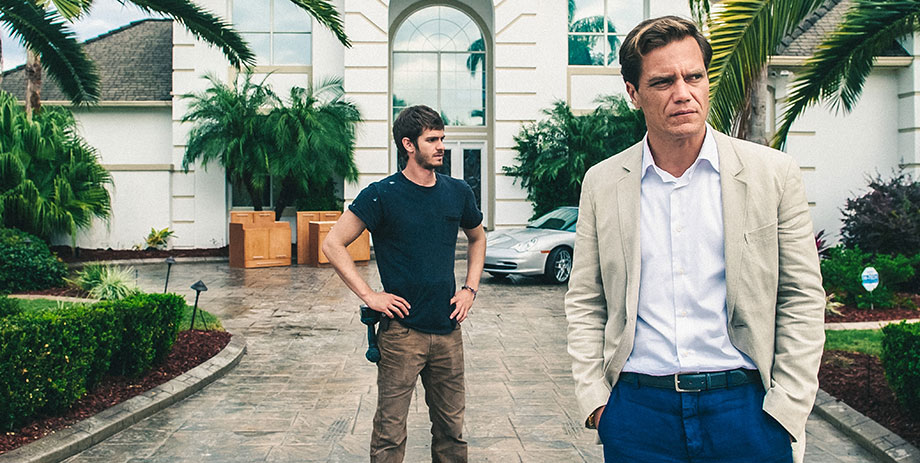With “99 Homes,” Ramin Bahrani has taken the subject of a social issue
drama and structured it like a thriller. The film hums along, perfectly paced and
driven by great performances all around. It’s also something of a call to arms,
an urgent instruction to pay closer to attention to one of the most defining
issues of our time: economic inequality. Seeing Bahrani’s film mere hours after
the premiere of Oren Moverman’s “Time Out of Mind,” a Richard Gere film about
the fact that homeless people have become so marginalized that they barely
exist in the social consciousness, it struck me that we could be on the cusp of
a wave of films about the unfair world in which we live. As Bahrani said in his
interview, through scratchy voice due to illness, “There’s something wrong in
this world, and we have to reassess.” There are times in “99 Homes” when you’ll
want to look away, when your gut will turn from the human pain on-screen. Don’t
look away. Reassess.
There are people watching their belongings go from the home
in which they raised their children to the curb where their garbage is picked
up while you read this review. Bahrani uses the housing crisis as a starting
point for a phenomenal piece of character-driven storytelling. Dennis Nash
(Andrew Garfield, who hasn’t been this good since “The Social Network”) lives
with his son and mother (the eternally great Laura Dern) in a modest Orlando
home. He has missed a few payments, although he tries to argue with the judge
at his hearing that it was a miscommunication with the bank and not an actual
economic shortfall. It doesn’t matter. Dennis is getting evicted. And when you’re
getting evicted in Orlando, you’re likely to cross paths with Richard Carver
(Michael Shannon).
Carver owns a realty company that feeds on the economic
crisis. As he says, he’s made more money after the crash than before it. He’s
the last person you want to see at your door. He’ll usually be there with a
couple cops, give you a few minutes to take what you need from your home, get
his guys to lug the rest out to the curb and then take ownership through
foreclosure. And that’s only one part of Carver’s business. He runs scams all
over town: stealing air conditioners from foreclosed homes so the government
will pay him to replace them (with another stolen air conditioner), using a “Cash
For Keys” system to grift from the government and much more. All of Carver’s
ventures have made him very rich, and that wealth has come from the economic disparity
and corruption that have forever damaged this country.
Dennis moves into a seedy motel with his mom and child,
desperate to find a way to get his home back. So desperate that he ends up
working for Carver. We become a part of the system that has destroyed us. Think
about that. How many people have been fired by companies that they, in whatever
way, contribute to the success of as consumers? Bahrani’s structure is a brilliant
one, in that it’s impossible to morally judge a man who is trying to keep his
mother and son safe, and yet there’s a sense of unease throughout Dennis’
journey, like watching a kid join the mob after it’s destroyed his life.
“99 Homes” plays like a thriller but it’s grounded by the
three-dimensional performances from Garfield and Shannon. The former finds the emotional
rhythm of a man without many options left. As so many people in this world are,
Dennis is forced into a situation he didn’t create and can’t avoid. And you can
see the inner turmoil in Garfield’s eyes. There’s less of a moral center in
Shannon’s fantastic work as Carver, but that’s what makes him so interesting.
Shannon wisely avoids turning him into a cartoon, even finding the realism in
this real estate shark. He’s using a corrupt system to his advantage. When he
says, “Only 1 in 100 is going to get on that Ark, son,” who can blame him for
trying to keep from drowning? Like all great socially conscious films, “99
Homes” doesn’t portray its issues in black and white, and Garfield and Shannon’s
nuanced work is what makes that gray area effective.
“99 Homes” pulses with energy from the very beginning.
Bahrani is always keeping his camera moving, timed to an unsettling
electronic-driven score. It is his most confidently made film. It doesn’t feel
like there’s a beat, a shot, an angle that’s out of place or unconsidered. And
yet that streamlined approach to filmmaking never corrupts Bahrani’s ability to
capture the human condition, as he did so completely in films like “Chop Shop”
and “Goodbye Solo.” The evictions of “99 Homes” are gut-wrenching. I found
myself, especially during the first one of Dennis and his family, remarkably
uncomfortable. I wanted to turn away. I felt myself squirming in my chair. But
I thought of Bahrani’s words and realized that this righteously angry film
should be tough to watch and emotionally difficult.
Reassess.












